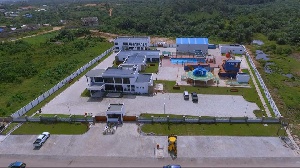 The Rigworld Training Centre will be inaugurated on November 15, 2017 at Kejebril in Takoradi
The Rigworld Training Centre will be inaugurated on November 15, 2017 at Kejebril in Takoradi
With increased mining activity in West Africa especially Ghana, it has become essential to have adequate and the necessary training facilities to train and empower its workforce so as to ensure that safety practices meet international standards.
It is on this premise that Ghanaian-owned service provider Rigworld International Services has led the way in establishing a safety training school to address this need. The Rigworld Training Centre, which will be officially inaugurated on Wednesday, 15th November 2017 at Kejebril, Takoradi in the Western Region serve as a catalyst to enabling better safety in the oil and gas exploratory ventures.
The center, valued at US$8.5 million is fully equipped with advanced simulators, helipad, water survival training pool, medical center, prime on-site accommodation, restaurant and fitness center.
The highly equipped oil and gas training facility, which is the first of its kind in the West African sub-region, has advanced simulators for real-time training and development.
The training center will offer a variety of safety and survival courses, including Basic Offshore Safety Induction and Emergency Training, Further Offshore Emergency Training, Helicopter Underwater Escape Training and Compressed Air Emergency Breathing System.
Other courses to be offered are Well Control and Intervention Training, Banksman and Slinger, Forklift Training, Crane Operations, Rope Access Training, Health, Hose Assembly Training, as well as provision of offshore medicals, among others.
Speaking in an interview with the General Manager of Rigworld Training Center Carlos Akyeampong, he said the idea of building the center was conceived in 2016, following the desire to find suitable and lasting solution to the problem of lack of relevant training and expertise within the oil and gas industry.
“The need to carry out jobs safely and competently within the oil and gas industry propelled the idea for an offshore training center. This is also in line with the regulators of the oil and gas sector Petroleum Commission’s commitments to as much as possible ensure local content and participation within the industry. The establishment of Rigworld Training Centre is, therefore, part of the forward-looking and giant steps to boost local content and participation in the oil and gas sector,” Mr Akyeampong added in a recent interview with the media.
The Local Content and Participation Policy was formulated to champion the cause of ensuring that Ghanaians constituted 90% of the workforce in the oil and gas sector by 2020. Shortly afterwards, the local content and local participation law was passed to enforce that vision. However, over seven years of oil production down the line, not much had been achieved in building local competence to fill this budding industry.
According to Kofi Abban, Managing Director of Rigworld International Services, the training center is a move geared towards supporting government’s effort to ensuring that enough locals are trained and well equipped to facilitate and execute the need of the oil sector within the confines of the internationally accepted practices and operations.
“It was against this background that our company decided to complement government's effort with the establishment of an international-standard oil and gas training center to train locals for this industry.”
Some have described the training center a haven of comfort, but in essence it a one of a kind well equipped oil and gas training center that is the first to be witnessed in Ghana and indeed the West African sub-region.
The launch of the Rigworld Training Centre hopes to attract more than 500 distinguished government officials and industry experts as well as well-wishers of Ghana’s booming oil and gas sector.